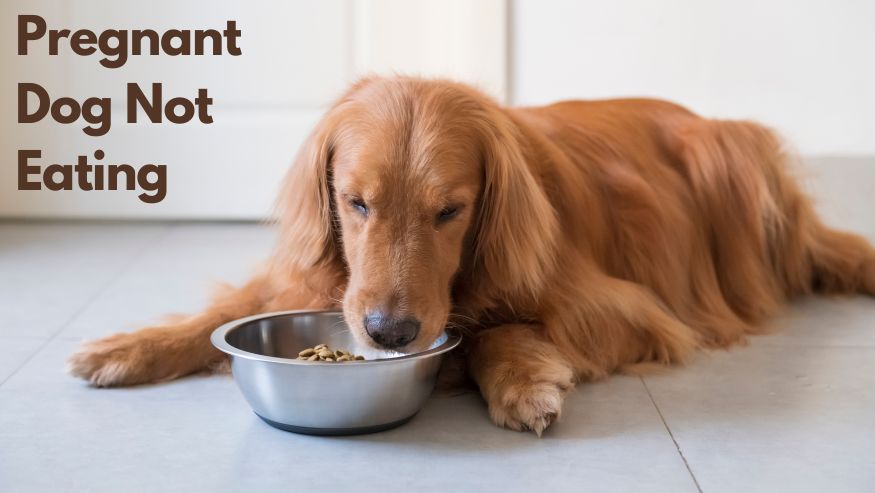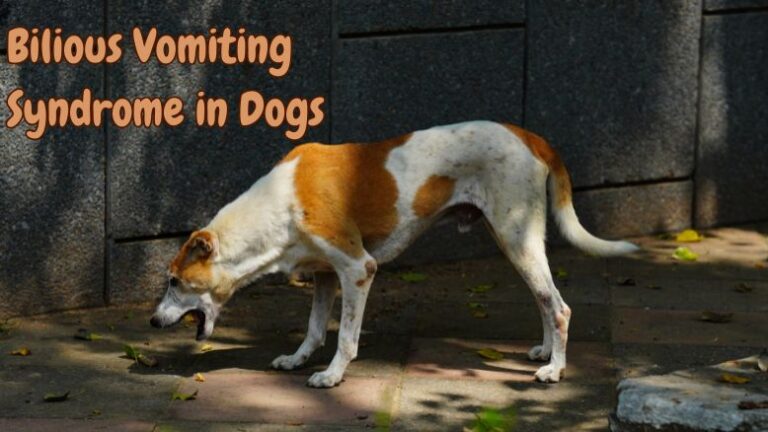
Is there a decrease in appetite in your pregnant dog? The problem must be resolved quickly.
A pregnant dog not eating could be a sign of underlying issues like stress, physical pain, or illnesses.
It is crucial to note behavioral changes and get advice from a veterinarian.
You can help your pregnant dog get through this difficult time and safeguard the health of the mother and puppies by giving her the care and attention she needs.
Possible Reasons for Pregnant Dog Not Eating:
Stress and Anxiety
A pregnant dog’s appetite can be significantly impacted by stress or anxiety, which might result in the dog not eating.
Stress can be brought on by alterations in the surroundings, loud noises, or even everyday adjustments.
Similar to this, being alone or in strange circumstances might cause uneasiness.
It is essential to identify and manage these emotional states to maintain the pregnant dog’s health and appetite.
Physical Discomfort
A pregnant dog’s appetite may be greatly affected by physical discomfort, leading to non-eating. Food may seem less attractive when experiencing digestive discomfort, such as indigestion or bloating.
Pregnancy-related symptoms like nausea and vomiting can also make eating more difficult.
It’s critical to take care of these physical issues as soon as possible to protect the pregnant dog’s health and get her to start eating again.
Medical Conditions
Pregnant dog not eating because of medical reasons. Canine pyometra is one example of an infection that can lead to systemic disease and appetite suppression.
Hormonal abnormalities such as hypothyroidism can also interfere with regular eating schedules.
Restoring the pregnant dog’s appetite and maintaining her general health depends on determining and treating these underlying medical issues.
Behavioral Factors
The food habits of a pregnant dog might also be influenced by behavioral factors. Food aversion can arise from unfavorable associations with specific foods.
In a similar vein, hormonal fluctuations or external stressors can cause depression, which in turn can cause a drop in appetite.
It is vital to comprehend and tackle these behavioral elements to motivate why pregnant dog not eating and preserve her well-being throughout her pregnancy.
Assessing the Situation: Why is Pregnant Dog Not Eating?
Observation of Behavior
It’s important to watch behavior when dealing with a pregnant dog not eating.
Keep an eye out for shifts in your energy and appetite.
Keep an eye out for any indications of discomfort or distress as well.
You may better understand your dog’s needs and solve any concerns impacting her hunger by paying close attention to her behavior.
Consulting with a Veterinarian
It is imperative to think about seeking advice from a veterinarian when dealing with a pregnant dog that is not eating.
Veterinarians can offer insightful information about underlying medical conditions that can be influencing your dog’s appetite.
By scheduling a veterinary consultation, you can ensure your dog’s health and well-being throughout her pregnancy by receiving individualized recommendations and treatment programs that cater to her unique needs.
Tips for Encouraging Eating:
Offering a Variety of Food Options
A pregnant dog that is not eating can be encouraged to regain her appetite by providing a range of food options.
Try a variety of flavors and textures to pique her curiosity about food. Think about adding wholesome substitutes like prepared meats, veggies, or premium store-bought dog food.
You can keep your dog from getting bored with food and encourage regular eating by rotating the menu.
Creating a Comfortable Environment
Providing a comfortable environment is crucial when managing an emaciated pregnant dog. Establish a distraction-free eating area that is peaceful and quiet.
Employ calming lighting and plush bedding to create a tranquil space.
Reducing distractions like loud noises and overindulgence in activity will put your dog at ease and motivate her to eat.
Maintaining a Regular Feeding Schedule
Keeping a consistent feeding plan is essential when dealing with a pregnant dog that refuses to eat.
To control her hunger and make sure she gets enough nutrients while pregnant, consistency is essential. Serve meals at predetermined periods throughout the day to avoid free feeding.
You can encourage healthy eating habits and increase your dog’s appetite by maintaining a schedule.
Providing Appetite Stimulants or Supplements
It may be helpful to give vitamins or appetite stimulants to a pregnant dog who is not eating. The vet may advise her to take medicine or use natural appetite stimulants to get her to eat.
These supplements can ensure she gets the necessary nutrition throughout her pregnancy and aid with temporary appetite loss.
To be sure, you should always get advice from a veterinarian before adding any new vitamins to your dog’s diet.
Addressing Underlying Medical Issues:
Importance of Veterinary Examination
One cannot stress the significance of a veterinary inspection for a pregnant dog not eating.
A comprehensive examination by a veterinarian is essential to detect any underlying medical conditions and guarantee the health of the dog and her offspring while she is pregnant.
Potential Medical Treatments or Interventions
When dealing with a pregnant dog that isn’t eating, it’s critical to look into possible medical interventions or therapies.
Depending on the underlying reason for appetite loss, veterinarians may suggest treatments, drugs, or surgery.
These treatments are intended to reduce pain, treat illnesses, and eventually improve the dog’s general health and appetite while she is pregnant.
Monitoring and Follow-Up:
Regular Check-Ups
A pregnant dog not eating has to have regular examinations. Veterinarians can keep an eye on the dog’s general health and evaluate any changes in behavior or appetite during these visits.
Veterinarians can offer advice on feeding techniques, modify treatment regimens as necessary, and monitor the health of the dog and her growing puppies at check-ups.
Adjusting Strategies as Needed
It’s crucial to modify tactics as necessary while handling a pregnant dog not eating. To come up with practical ideas to stimulate her appetite, flexibility is essential.
Depending on the dog’s reaction, veterinarians may suggest modifying the diet, adding supplements, or changing the prescription.
Throughout her pregnancy, you may assist the dog’s health and well-being by regularly evaluating and modifying tactics.
Conclusion:
In conclusion, a pregnant dog not eating may raise some red flags, but the issue can be successfully resolved with the right attention and expert advice.
Pet owners may contribute to the health and well-being of their expectant canine friend and her puppies by learning the potential causes of appetite loss, evaluating the situation, putting tactics in place to encourage eating, and taking care of any underlying medical issues.
Recall that early intervention and placing the health of the expectant dog first are necessary for a successful pregnancy journey.





